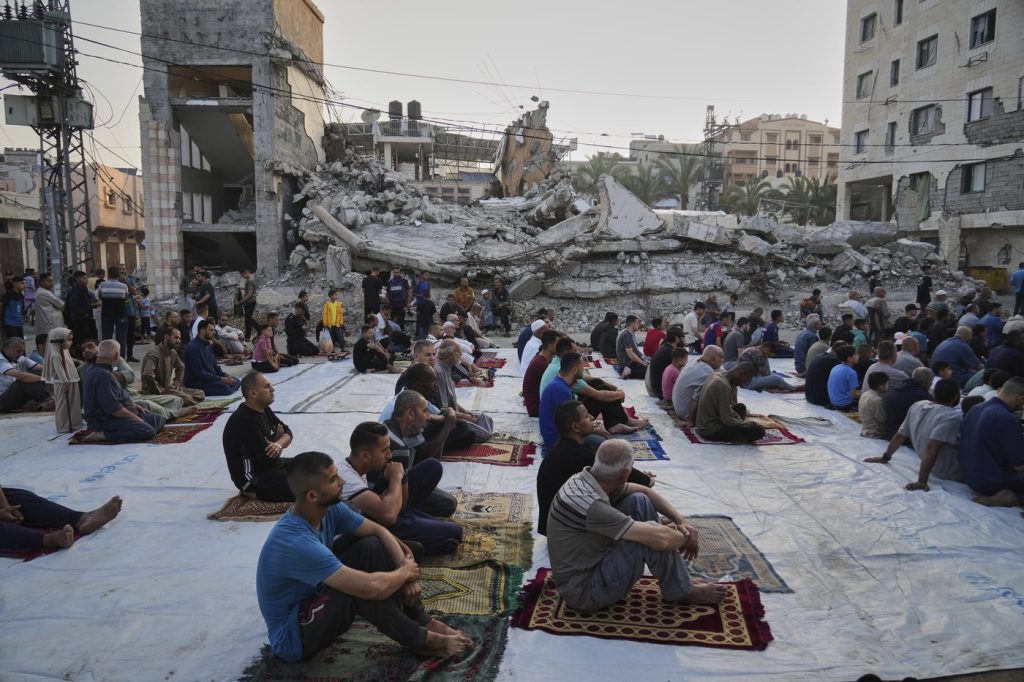DEIR AL-BALAH, Gaza Strip (AP) - Palestinians across the Gaza Strip began the observance of Eid al-Adha early Friday with prayers conducted outside the ruins of destroyed mosques and homes. With the ongoing war with Israel, hope for an imminent resolution appears bleak. The destruction has rendered much of Gaza uninhabitable, forcing men and children to pray in the open air as food supplies dwindle, compelling families to scrape together whatever meager resources they can for the holiday festivities.
Kamel Emran, a resident of Khan Younis, expressed the profound difficulties faced by the community, stating, "This is the worst feast that the Palestinian people have experienced because of the unjust war against the Palestinian people. There is no food, no flour, no shelter, no mosques, no homes, no mattresses… The conditions are very, very harsh."
The Islamic holiday, which marks the 10th day of Dhul-Hijja, coincides with the Hajj pilgrimage season in Saudi Arabia. However, for the second consecutive year, Muslims in Gaza have been unable to travel to Saudi Arabia to perform the pilgrimage, adding to the sense of loss during this significant time.
The war erupted on October 7, 2023, following a surprise attack by Hamas-led militants on Israel that resulted in the deaths of approximately 1,200 people, predominantly civilians, and the kidnapping of 251 individuals. Currently, 56 hostages remain held by Hamas, with around a third believed to be alive after most were released through ceasefire agreements or other negotiations. Moreover, as a result of Israel's military campaign, more than 54,000 Palestinians have been reported killed, with the Gaza Health Ministry's figures encompassing both civilians and combatants.
Israel's offensive has devastated large sections of Gaza, displacing around 90% of its population, which stands at roughly 2 million Palestinians. After a prolonged blockade that lasted over two months, Israel has recently started allowing a limited amount of food and aid to enter Gaza for the United Nations, yet distribution efforts have been hampered by Israeli military restrictions on movement and unsafe conditions along designated routes.
The United Nations' Food and Agriculture Organization (FAO) projected that the population of Gaza is on the brink of acute food insecurity by September. Nearly 500,000 individuals are expected to experience extreme food deprivation, leading to severe malnutrition and starvation. Rein Paulson, director of the FAO's emergency and resilience office, remarked, "This means the risk of famine is really touching the whole of the Gaza Strip."
In recent weeks, violent encounters have erupted almost daily in Gaza, particularly near new distribution points where desperate residents have been directed to collect food. Witnesses have reported that Israeli troops opened fire nearby, resulting in over 80 fatalities as documented by local hospital officials. Israel has accused Hamas of appropriating aid and obstructing its delivery to Palestinians, claiming soldiers only fired warning shots in certain situations.
The newly established Gaza Humanitarian Foundation, consisting primarily of American contractors, aims to replace existing humanitarian groups aiding distribution within Gaza under United Nations coordination. However, on Friday, the organization announced that all distribution centers were closed due to ongoing violence, urging individuals to stay away for their own safety and indicating that further announcements regarding the resumption of aid distribution would follow.











